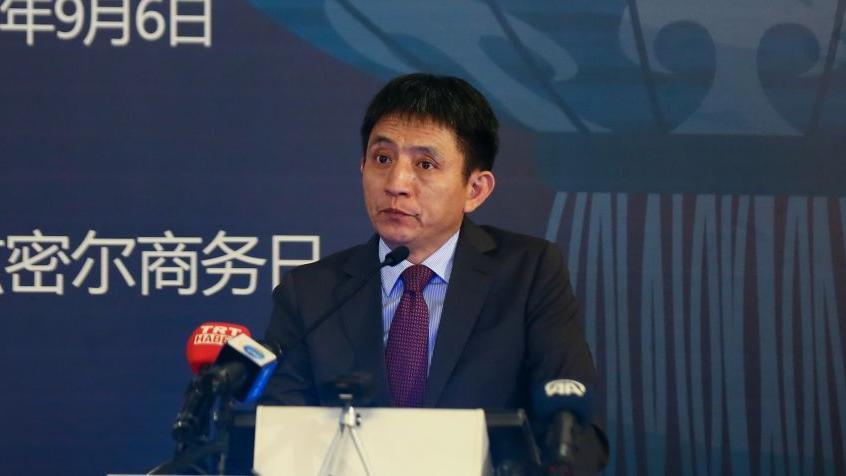China appoints new trade envoy in face of tariff turmoil

Li Chenggang is a former World Trade Organisation and UN representative
- Published
China has unexpectedly appointed a new trade envoy, as officials said the US's practice of "tariff barriers and trade bullying" is having a serious impact on the global economic order.
Li Chenggang, a former assistant commerce minister and WTO ambassador, is taking over from veteran trade negotiator Vice Commerce Minister Wang Shouwen.
The shift comes as Beijing refuses to back down in an escalating trade war with Washington triggered by US President Donald Trump's hefty tariffs on Chinese goods.
China's already sluggish economy is bracing for the impact on a key source of revenue - exports.
Beijing announced on Wednesday its GDP grew by 5.4% between January and March, compared with the same period a year earlier.
The figure has exceeded expectations but reflects the period before US tariffs jumped from 10% to 145%, and Chinese officials warned of more economic pain ahead.
While both Washington and Beijing have said they are open to negotiating, neither have made a move to do so yet.
When that happens, Li, 58, will play a key role. He previously served as a deputy permanent representative to the United Nations in Geneva and has held several key jobs in the commerce ministry.
Speaking to Reuters, one expert said the change in jobs was "very abrupt and potentially disruptive" given the current trade tensions - adding that Wang also had experience negotiating with US since the first Trump administration.
"It might be that in the view of China's top leadership, given how tensions have continued escalating, they need someone else to break the impasse... and finally start negotiating," said Alfredo Montufar-Helu, a senior adviser to the Conference Board's China Centre.
However, another analyst who spoke to Reuters suggested the move could just be a "routine promotion" that just happened to come at a particularly tense period in time.
The US should 'stop whining'
Speaking at a press conference on Wednesday, Sheng Laiyun, deputy commissioner of the National Bureau of Statistics (NBS) warned that US levies would put pressure on China's foreign trade and economy, but added that China's economy is resilient and should improve in the long term.
"We firmly oppose the US practice of tariff barriers and trade bullying," said Sheng.
"It violates the economic laws and the principles of the World Trade Organization, has a serious impact on the world economic order, and drags down the recovery of the world economy."
In an editorial by state news outlet China Daily earlier this week, the outlet described the US's behaviour as "capricious and destructive", adding that it should "stop whining about itself being a victim in global trade".
"The US is not getting ripped off by anybody...rather... [it] has been taking a free ride on the globalisation train," the editorial went on to say.

Retail sales were up in March as policies to boost economy took hold
Promising growth - but will it last?
Beijing's GDP figures for the first quarter have beaten analysts' expectations - which hovered around 5.1%.
Growth in the world's second-largest economy was underscored by strong retail sales and promising factory output.
But US tariffs on China soared only in recent weeks. Trump raised them to 145% early last week, and Beijing retaliated by raising levies on US goods to 125%.
So some of the expansion could be down to factories rushing out shipments to beat Trump's tariffs - a concept called "front loading".
Analysts say a surge in China's exports in March will be sharply reversed in the months ahead as tariffs take full effect.
China's property downturn is also still dragging on growth. Property investment fell by almost 10% in the first three months of 2025 compared to the same period last year.
New home prices also were unchanged compared to the previous month - a sign that there are still too many empty homes, and not enough people buying them.
Officials have said there is ample room for stimulus measures, and plenty of tools that they can use to bolster the economy and roll out more support measures.
But it will be especially important for China to boost domestic demand and spending this year as Washington's tariffs hits Beijing's crucial export sector.